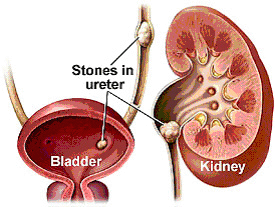Kidney Stones – Nephrolithiasis
Under normal circumstances, the urine contains many dissolved crystalline substances. During periods of dehydration or when the concentration of the substance is excessive then the crystals may no longer be dissolved in solution and actually be visible, as in particles of sugar. A stone is formed as these crystals build on each other-not very different from a cluster of rock candy.

The incidence of having had stone disease can be as high as 12% by the age of 70. Males are afflicted at 3 times the rate of women with the peak incidence occurring during the third decade of life. Stone disease has a tremendous impact on the workforce. Kidney stones are responsible for countless days of lost productivity not to mention the debility of experiencing one or more of these excruciating episodes of flank pain and blood in the urine.
The most common stones are composed of calcium oxalate. High protein diets are associated with the production of uric acid stones. Some medical conditions have a higher risk of producing kidney stones. The importance of retrieving stone material for crystallographic analysis cannot be overemphasized. There is a high incidence of recurrent stone formers and these patients are encouraged to undergo a stone risk work-up to help identify and correct predisposing factors which might contribute to further stone production.
Dr. Frank sees patients at his West Orange office from nearby New Jersey towns, serving Livingson, Short Hills, Millburn, Maplewood, Montclair, Essex Fells, South Orange, Verona, Caldwell, and West Caldwell.


